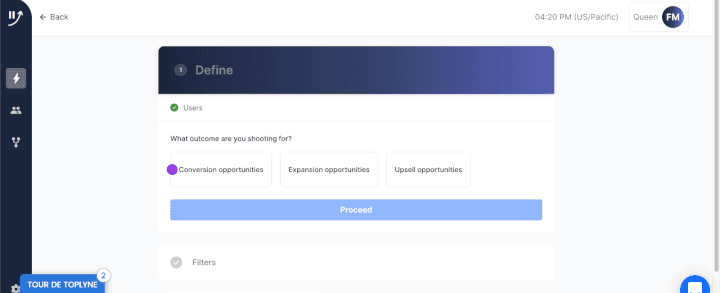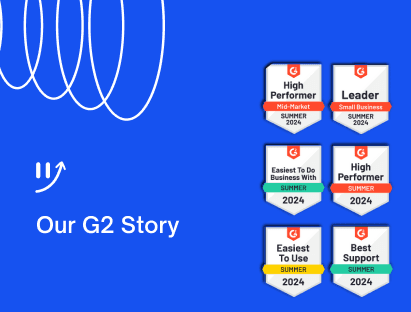How to Create a Kick-Ass Product-Led Onboarding Experience
How to Create a Kick-Ass Product-Led Onboarding Experience
How to Create a Kick-Ass Product-Led Onboarding Experience
Learn about product-led onboarding and how to create an effective product-led onboarding experience.
Learn about product-led onboarding and how to create an effective product-led onboarding experience.
Learn about product-led onboarding and how to create an effective product-led onboarding experience.



Are your users ghosting you like Tinder dates right after signing up? 💔
You’re not alone.
People signing up and not sticking around is a real growth problem for most SaaS companies.
But why does this happen?
Is your product not a great date? 😟
Na-uh. It’s usually an onboarding problem.
Before your product and users live happily ever after, you have to ensure they start using the product — and right.
So, how can you ensure your product makes a fantastic first impression on your users?

How?
Simple: through product led onboarding!
In this article, we’ll cover what is product led onboarding and how to create a successful product led onboarding experience.
Let’s get onboard!
What is Product-Led Onboarding?
Product-led onboarding is the method of introducing users to product features based on their needs and position in the customer journey.
This means users are welcomed by features best suited for them, based on data related to:
Behavior
Purchases
Demographics
And firmographics (descriptive details used by B2B firms to segment their target market and find their ideal customers)
Consider it your courting session with your users. 💕

Product-led onboarding is a revenue multiplying method. It attracts more customers by giving users a satisfying and personalized first date (user experience) with your product.
Some examples of product-led onboarding success:
Simple and short signup pages
Minimal user data extraction early in the onboarding phase
Learn-by-doing approach (in-app)
Charming and personality-rich interaction
This great onboarding approach branches from a wider school of thought: product-led growth (PLG).
The product-led growth strategy focuses on “try before you buy.” A PLG company then employs product led onboarding to make that “try” a pleasant and unique experience. This way, you can boost revenue and convert old as well as new users to lifelong customers.
Clearly, the product-led approach and onboarding have a connection!
Let’s dig into their relationship!
Product-Led Growth and User Onboarding: What’s the Connection?
Many SaaS companies employ the PLG strategy to enjoy improved customer acquisition, product usage, customer success, and retention rates.
But where does onboarding fit in?
In PLG or product led companies, user onboarding:
Is a natural retention lever. To ensure customers keep dating your product, you need to make a good impression through the onboarding process.
Is a revenue multiplier. Happy customers might refer more users to your product, which automatically multiplies your revenue. 💰
Means a lower customer acquisition cost. Since the product led onboarding requires minor involvement from the sales and marketing teams, you can significantly decrease your customer acquisition cost.
Need more clarity on the product led growth strategy?
Check out the key differences between product led growth vs sales led growth.
Also, go over how a PLG company uses product led sales to identify well-qualified prospects quickly.
Now that we know PLG and product led onboarding are connected to each other, let’s move over to what’s probably on your mind…
How to Create a Successful Product-Led Onboarding Experience
Product-led onboarding should be part of your product strategy for customer acquisition and product growth.
To get you started, here’s a quick guide on how to create a successful product-led onboarding experience:
1. Assemble an Onboarding Team
You’ve got the sales team. The product team and product managers. Operations.
Who’s taking up customer onboarding? 🤔
Start by creating a dedicated, great onboarding team with user interface developers and customer service agents. They can effectively work on:
Creating customer onboarding processes
Educating the users
Improving product adoption
Recognizing pain points in the customer journey
Increasing customer and product engagement
Creating product tours
Gathering product analytics
Developing an onboarding program
And more!
2. Create a Simple Signup Process
No one likes a nosy signup page that won’t stop asking for details.
You know the ones that want to know your entire family history and your favorite ice cream flavor? Ugh!
You can avoid this by making the signup process as smooth and short as possible and the onboarding content easy to comprehend — so users can start using your product.

Here’s how you can create a simple signup process:
Ensure forms are short and accounts are easy to create.
Delay email verification until after your user’s first session. This lets them try your app first, improving the initial product experience and chances of retention.
Avoid asking for credit card details early in the free trial signup process (No one likes it when there are strings attached to the word "free!")
3. Understand the Users’ Desired Outcome
When you’re on a date, you try to figure out what the other person likes, right?
Do the same with your users for product growth!
Why are they signing up?
Try to understand what they want to achieve.
Understanding their preferences and priorities properly can help you personalize their onboarding journey. So gather as much data as possible without making the signup process needlessly long.
This should give you valuable insights into constructing your desired onboarding flow or pathway.
3. Drive Users to the Aha! Point
After you’ve gathered some key data, help your users reach that point where they go…

That right there is when an old or even new user starts to experience value from your product by engaging with its core features.
But you have to consistently help them achieve customer success to convert them into paid users eventually.
You can do this by creating an in-app onboarding checklist or simple product tours that structures the onboarding process. Or just design an effective onboarding flow to help users engage with your product’s key features — that your product team and product manager made with love.
This way, you can drive them towards the Aha! moment quickly — making product adoption easy and customer feedback positive.
But how do you identify the users who are reaching that Aha! point?
Meet Toplyne!
This tool lets growth teams at any product led SaaS company quickly identify promising leads (most likely to convert, buy more, churn, etc.) and monetize their PLG.
In other words, Toplyne is the matchmaker that’ll find you dates (users) with the potential to become your forever partners (lifelong customers). ♥️ 🤝

Here’s what Topylne can do for your SaaS company using product usage data:
Increase conversions within your freemium user base.

Experiment with diverse conversion strategies to execute your go-to-market (GTM) strategy. You can choose from remarketing, automated messaging, sales-assist motions, and in-product nudges.

Craft tailored experiences in-product to encourage users to invite more team members.
Integrate with your existing marketing tools (Mixpanel, Amplitude, etc.) and product usage data to examine active users with both high and low conversion potential.

Prepare your SaaS sales team with relevant information needed to convert users into paid customers.
Drive self-serve conversions through in-product nudges (paywalls, chatbots, promos) or sales-assisted conversions.
4. Don’t Forget the Rest of the User Journey
The product led onboarding process doesn’t stop at the Aha! moment.
You don’t just want to convert and retain customers.
Instead, you want users to see the value in your product every day and encourage them to upgrade.
Offer users relevant guidance at every stage to introduce them to the benefits of advanced features — improving product engagement and customer experience.
While you’re at it, let Toplyne use some product analytics to help you spot users likely to upgrade. 💲📈
5. Continue to Optimize the Product Led Onboarding Experience
The onboarding process is continuous, and your product should constantly evolve, just like any relationship. 👩❤️👩
Here’s how you can keep things interesting and spice up your product experience:
Roll out new features
Tweak product functionality for a better user experience
Push updates and live improvements
Update onboarding content to stay relevant
Conduct intuitive surveys
Most importantly, you need to keep communicating with every old and new user.
For example, use banners in your app to drive new feature discovery and eventually product growth. A banner is a subtle yet effective way to attract attention to upcoming updates.
You can also offer self-service, on-demand support options (preferably in-app). It empowers a user to solve their problems independently without relying on an agent.
Finally, regularly ask for customer feedback to identify pain points and areas of improvement in customer experience and product experience.
Product-Led Onboarding: Swipe Left or Right?
Definitely swipe right!
Converting new users into loyal, lifelong customers is the dream of SaaS and product led companies.
And for that, you just need an effective product led onboarding program or strategy and a powerful tool that can spot potential leads.
Psst… Toplyne is a perfect match!
Soon your users won’t get enough of your product while you skyrocket revenue, customer success, and retention rates.
Ready for some product-led onboarding success?
Sign up for Toplyne for free today to effectively employ the PLG strategy and make your old and new users fall in love with your product! 🥰

Are your users ghosting you like Tinder dates right after signing up? 💔
You’re not alone.
People signing up and not sticking around is a real growth problem for most SaaS companies.
But why does this happen?
Is your product not a great date? 😟
Na-uh. It’s usually an onboarding problem.
Before your product and users live happily ever after, you have to ensure they start using the product — and right.
So, how can you ensure your product makes a fantastic first impression on your users?

How?
Simple: through product led onboarding!
In this article, we’ll cover what is product led onboarding and how to create a successful product led onboarding experience.
Let’s get onboard!
What is Product-Led Onboarding?
Product-led onboarding is the method of introducing users to product features based on their needs and position in the customer journey.
This means users are welcomed by features best suited for them, based on data related to:
Behavior
Purchases
Demographics
And firmographics (descriptive details used by B2B firms to segment their target market and find their ideal customers)
Consider it your courting session with your users. 💕

Product-led onboarding is a revenue multiplying method. It attracts more customers by giving users a satisfying and personalized first date (user experience) with your product.
Some examples of product-led onboarding success:
Simple and short signup pages
Minimal user data extraction early in the onboarding phase
Learn-by-doing approach (in-app)
Charming and personality-rich interaction
This great onboarding approach branches from a wider school of thought: product-led growth (PLG).
The product-led growth strategy focuses on “try before you buy.” A PLG company then employs product led onboarding to make that “try” a pleasant and unique experience. This way, you can boost revenue and convert old as well as new users to lifelong customers.
Clearly, the product-led approach and onboarding have a connection!
Let’s dig into their relationship!
Product-Led Growth and User Onboarding: What’s the Connection?
Many SaaS companies employ the PLG strategy to enjoy improved customer acquisition, product usage, customer success, and retention rates.
But where does onboarding fit in?
In PLG or product led companies, user onboarding:
Is a natural retention lever. To ensure customers keep dating your product, you need to make a good impression through the onboarding process.
Is a revenue multiplier. Happy customers might refer more users to your product, which automatically multiplies your revenue. 💰
Means a lower customer acquisition cost. Since the product led onboarding requires minor involvement from the sales and marketing teams, you can significantly decrease your customer acquisition cost.
Need more clarity on the product led growth strategy?
Check out the key differences between product led growth vs sales led growth.
Also, go over how a PLG company uses product led sales to identify well-qualified prospects quickly.
Now that we know PLG and product led onboarding are connected to each other, let’s move over to what’s probably on your mind…
How to Create a Successful Product-Led Onboarding Experience
Product-led onboarding should be part of your product strategy for customer acquisition and product growth.
To get you started, here’s a quick guide on how to create a successful product-led onboarding experience:
1. Assemble an Onboarding Team
You’ve got the sales team. The product team and product managers. Operations.
Who’s taking up customer onboarding? 🤔
Start by creating a dedicated, great onboarding team with user interface developers and customer service agents. They can effectively work on:
Creating customer onboarding processes
Educating the users
Improving product adoption
Recognizing pain points in the customer journey
Increasing customer and product engagement
Creating product tours
Gathering product analytics
Developing an onboarding program
And more!
2. Create a Simple Signup Process
No one likes a nosy signup page that won’t stop asking for details.
You know the ones that want to know your entire family history and your favorite ice cream flavor? Ugh!
You can avoid this by making the signup process as smooth and short as possible and the onboarding content easy to comprehend — so users can start using your product.

Here’s how you can create a simple signup process:
Ensure forms are short and accounts are easy to create.
Delay email verification until after your user’s first session. This lets them try your app first, improving the initial product experience and chances of retention.
Avoid asking for credit card details early in the free trial signup process (No one likes it when there are strings attached to the word "free!")
3. Understand the Users’ Desired Outcome
When you’re on a date, you try to figure out what the other person likes, right?
Do the same with your users for product growth!
Why are they signing up?
Try to understand what they want to achieve.
Understanding their preferences and priorities properly can help you personalize their onboarding journey. So gather as much data as possible without making the signup process needlessly long.
This should give you valuable insights into constructing your desired onboarding flow or pathway.
3. Drive Users to the Aha! Point
After you’ve gathered some key data, help your users reach that point where they go…

That right there is when an old or even new user starts to experience value from your product by engaging with its core features.
But you have to consistently help them achieve customer success to convert them into paid users eventually.
You can do this by creating an in-app onboarding checklist or simple product tours that structures the onboarding process. Or just design an effective onboarding flow to help users engage with your product’s key features — that your product team and product manager made with love.
This way, you can drive them towards the Aha! moment quickly — making product adoption easy and customer feedback positive.
But how do you identify the users who are reaching that Aha! point?
Meet Toplyne!
This tool lets growth teams at any product led SaaS company quickly identify promising leads (most likely to convert, buy more, churn, etc.) and monetize their PLG.
In other words, Toplyne is the matchmaker that’ll find you dates (users) with the potential to become your forever partners (lifelong customers). ♥️ 🤝

Here’s what Topylne can do for your SaaS company using product usage data:
Increase conversions within your freemium user base.

Experiment with diverse conversion strategies to execute your go-to-market (GTM) strategy. You can choose from remarketing, automated messaging, sales-assist motions, and in-product nudges.

Craft tailored experiences in-product to encourage users to invite more team members.
Integrate with your existing marketing tools (Mixpanel, Amplitude, etc.) and product usage data to examine active users with both high and low conversion potential.

Prepare your SaaS sales team with relevant information needed to convert users into paid customers.
Drive self-serve conversions through in-product nudges (paywalls, chatbots, promos) or sales-assisted conversions.
4. Don’t Forget the Rest of the User Journey
The product led onboarding process doesn’t stop at the Aha! moment.
You don’t just want to convert and retain customers.
Instead, you want users to see the value in your product every day and encourage them to upgrade.
Offer users relevant guidance at every stage to introduce them to the benefits of advanced features — improving product engagement and customer experience.
While you’re at it, let Toplyne use some product analytics to help you spot users likely to upgrade. 💲📈
5. Continue to Optimize the Product Led Onboarding Experience
The onboarding process is continuous, and your product should constantly evolve, just like any relationship. 👩❤️👩
Here’s how you can keep things interesting and spice up your product experience:
Roll out new features
Tweak product functionality for a better user experience
Push updates and live improvements
Update onboarding content to stay relevant
Conduct intuitive surveys
Most importantly, you need to keep communicating with every old and new user.
For example, use banners in your app to drive new feature discovery and eventually product growth. A banner is a subtle yet effective way to attract attention to upcoming updates.
You can also offer self-service, on-demand support options (preferably in-app). It empowers a user to solve their problems independently without relying on an agent.
Finally, regularly ask for customer feedback to identify pain points and areas of improvement in customer experience and product experience.
Product-Led Onboarding: Swipe Left or Right?
Definitely swipe right!
Converting new users into loyal, lifelong customers is the dream of SaaS and product led companies.
And for that, you just need an effective product led onboarding program or strategy and a powerful tool that can spot potential leads.
Psst… Toplyne is a perfect match!
Soon your users won’t get enough of your product while you skyrocket revenue, customer success, and retention rates.
Ready for some product-led onboarding success?
Sign up for Toplyne for free today to effectively employ the PLG strategy and make your old and new users fall in love with your product! 🥰

Related Articles




Behavioral Retargeting: A Game-Changer in the Cookieless Era
Unlock the power of behavioral retargeting for the cookieless future! Learn how it personalizes ads & boosts conversions. #behavioralretargeting




All of Toplyne's 40+ Badges in the G2 Spring Reports
Our customers awarded us 40+ badges in G2's Summer Report 2024.




Unlocking the Full Potential of Google PMax Campaigns: Mastering Audience Selection to Double Your ROAS
Copyright © Toplyne Labs PTE Ltd. 2024
Copyright © Toplyne Labs PTE Ltd. 2024
Copyright © Toplyne Labs PTE Ltd. 2024
Copyright © Toplyne Labs PTE Ltd. 2024